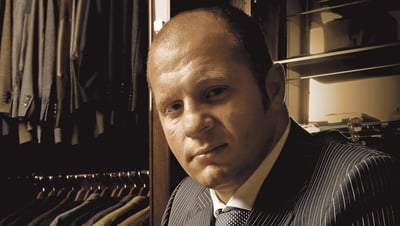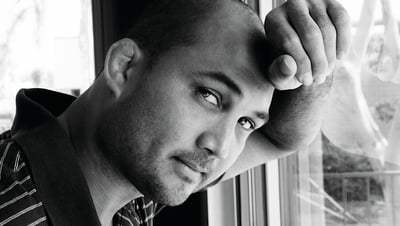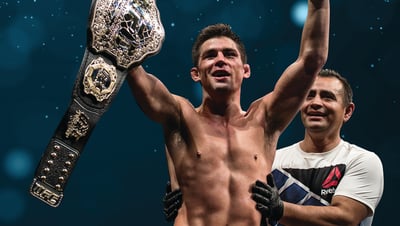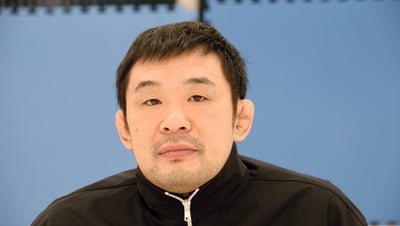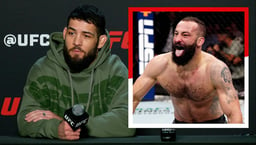
Issue 204
April 2024
Robert Whittaker is tackling the stereotypes of what it means to be a professional fighter. In the age of larger-than-life personalities, hyped-up rivalries, and hairstyles that require their own zip code, it takes a unique fighter to be himself. Whittaker’s unconventional approach, shaped by a rich Maori and Samoan heritage, has seen him celebrated for his integrity and the respect he gives to his rivals. He exemplifies the virtues of discipline, respect, and resilience—which is why fans cherish him as a role model. Whether preparing for a grueling fight, sharing insights on mental fortitude, or clocking up some quality family time, Whittaker's life is a compelling narrative of balancing his identity with the demands of being at the pinnacle of one of the world’s most challenging sports. In the lead-up to his bout with Khamzat Chimaev on 22 June 2024 in Saudi Arabia, Fighters Only’s Ray Klerck caught up with him to discuss why he’s a man who stands apart in the world of MMA.
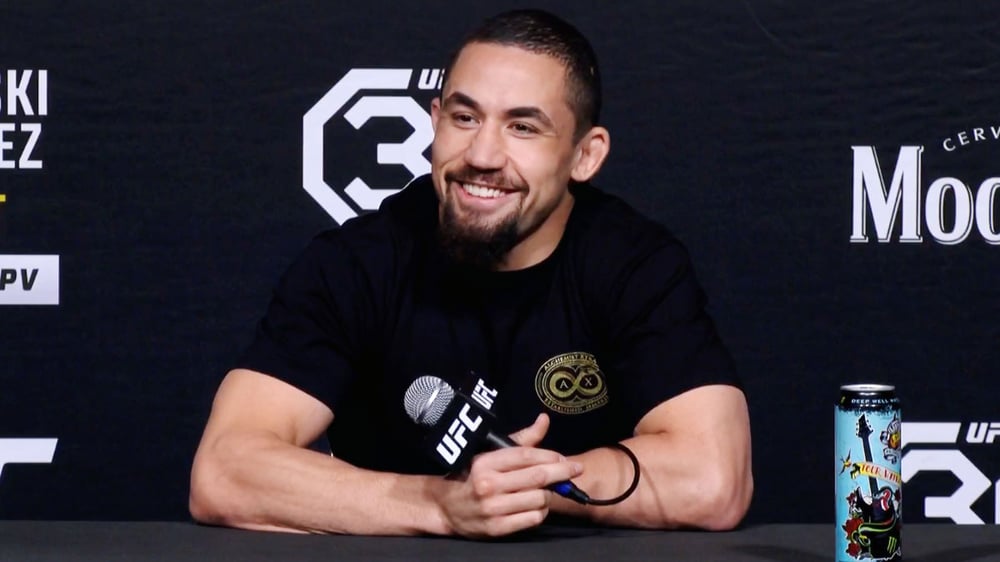
WINNING THE MENTAL GAME
Whittaker has always set a sterling example without a single blip on his record regarding being an upstanding gentleman in and out of the ring. It’s a skill that requires mental fortitude and something he’s deployed in the final moments before a packed arena. While he may seem calm, there’s a battle waging on the inside. “You’d think that the process would get easier by now, but it’s battle and a process every time, you know,” he says when pressed about his pre-fight preparations. “And it's one of those things that, if you let it, the nerves and anxiety will just take over. It'll just run rampant. The moments when you’re in the back room and the guys coming in and say, ‘Rob, you're out, let's go,’ and you’re walking out, then you're standing in the hallway, and you're getting ready. That is when it's time to really just delve into your own head and just block out all the noise and understand what you came here for. Try to get yourself into the mind frame and headspace needed to, you know, to want to go the 15 or 25 minutes that's ahead.”
This skill has put him in good stead against some of the world’s best. “If you relax your grip on the reins at all, it'll run away on you,” he smiles. “You know, you are getting bucked off that horse, and the fall is going to hurt. It's just something you need to be on constantly.”
WARRIOR HERITAGE
Whittaker was born in New Zealand and has M?ori and Samoan heritage, a heritage that that influenced both his fighting style and professional ethos. “It's a side of me that I've always been very proud of,” he says. “I fully acknowledge and recognize that I have the blood of warriors in me. And I take that confidence into every fight, into my training, into the practice rooms. I know that I was born and made to do this. Confidence like that isn't just isn't something you fake. It's almost like a superpower of mine, and I do consider myself very blessed to have it.”
There can sometimes be a divide between Australians and New Zealanders when it comes to sport, but Whittaker’s demeanor has seen him become a sportsman adored by both nations. “I’ve got a ton of family over there (New Zealand) as well, but with the kids and with the roller coaster of life, I haven't been back anywhere near as much as I should, but it is something that I do want to delve into and, and dive back into. I have been meaning to take the family over to see all their cousins and uncles. It's been too long, and I was actually thinking about after this next fight taking the kids over to New Zealand. It's close enough, and it's time they saw where we come from.”
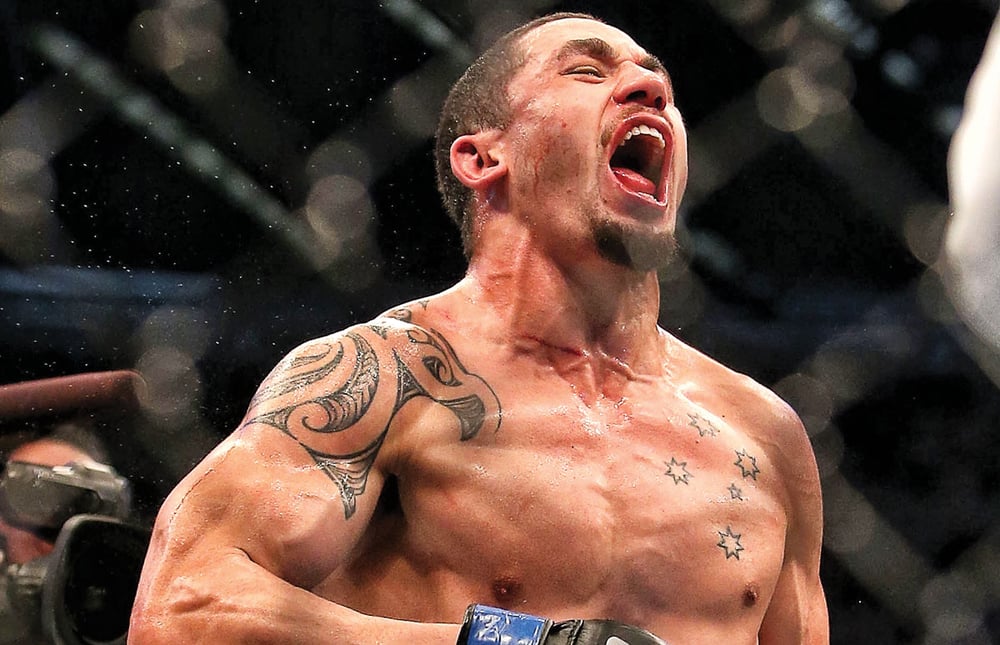
THE GOOD FIGHT
He made his UFC debut in 2012 and has upgraded with nearly every opponent, beating some of MMA’s greats. These are the likes of Uriah Hall, Yoel Romero, and Paulo Costa, but one fight stands out to him. “The first one would have to be winning The Ultimate Fighter,” he smiles. “I think that that fight is obviously significant in that I won the tournament, but that was that was the start of my career. That was the start of Rob Whittaker in the UFC, and a lot has come from that.” From that moment, he approached the pre-fight training differently when preparing for each opponent. “Holistically, my team and I understand that hard work beats all, and we understand that we need to delve into our camps and fights with the confidence that the work has been done,” he says. “My coaches will look at my opponents, see their particular strengths, and start changing the scheduling or programs to suit that. How I trained when I was 20 isn't how I train now at 33. It's just not possible. And I think the people who try to do that get themselves in trouble. But the mentality is that it's much like I said earlier, where you cannot loosen the grips on the reins. You need to have that workhorse mentality. You need to have that dog in you to grind through the session. I think that's the only consistent really across every camp.”
SETBACKS SET EXAMPLES
After a setback, such as a loss or an injury, Whittaker has created a process for getting back into that peak condition, both physically and mentally. “Losing makes you question and doubt everything you've been doing up until that point. But I guess it takes a lot of strength and courage to have faith to sit down with your team and pull things apart without throwing the baby out with the bathwater. So, it's important to find what you liked, what you did not like, and then you get back on the horse. You understand that you've done this before. You know, this isn't the first time. Hopefully, you've had a loss, and you can build back from it. What are you going to do, quit? You can't quit, mate. You only really lose when you give up.”
This mindset is one of Whittaker’s core values, which he wants to impart to the next generation. “I think it's so important for anyone that has any sort of spotlight or media fame or just anyone that anyone, anywhere where people are watching you. It is your responsibility to be a good example, you know, to make the world that we live in, to make society better from it. It makes me upset seeing all these guys that have so much media presence and spotlight and they take advantage of that. They don't give it the respect it deserves. I live by a personal mantra of lead by example. And there isn't anything that I would do that I don't expect my kids to do when they're 10 years, 20 years older. The younger generation only has us to guide them. They only have us to lead the way, to be examples. We need to show them the blueprint of what you can be and how you can achieve it. And I think it's so important. I know a lot of guys just don't give it the gravity and respect it deserves.”

TRASHING THE TRASH TALK
Hype sells fights. Sonnen. Diaz. Strickland. McGregor. It’s why they’ve had some of the biggest battles in history, but Whittaker takes the opposite approach. He has some advice for fighters who wish to stay respectful of their opponents. “Have faith in your work,” he says. “Get in there and walk the walk instead of talking it. It takes a lot of discipline to not engage in that sort of crap. It's much easier to just start running your mouth. It's so much easier to like when someone says something to you to just start having a go back at them. Or when the people or the media or everybody's having a jibe saying so and so said this about you, it's so much easier to just, you know, get carried away with it all. So, I don't know, it's just be a good person, be a good man. Let your fights speak for you.” Rare words in a world where everyone seems to have negative words for their opponents.
ALWAYS ADAPTING
Whittaker is a fighter who is constantly evolving, and this is something you can expect to see in his next fight. “With every fight, you change as a person, so your training has to change with you, and you need to go along with that. That doesn't mean you stop working hard. You never stop working hard. But I can't expect to train the way I did when I was 20 nowadays because there are so many more variables and so many more things that I need to consider. I don't recover the same as I did when I was 20. I used to be able to run through traffic and be fine. You need to change with it and adapt to change. If something's not working, maybe mix it up for a little bit, get a breath of fresh air, and try something new. Keep your interest alive. I think adapting to change is important because change is the only constant in a way. And I think that has been a big part of how I've been able to stay where I am and compete at an elite level for so long.”
With this in mind, there is plenty to expect from him when he battles Khamzat Chimaev, who is currently unbeaten. When quizzed about what he’ll change, his response is decisive.
“Oh, mate, a hell of a lot more wrestling,” he smiles. “I understand that he's got a really strong wrestling game. I understand he's a dangerous fighter. He's undefeated, and he's riding the current hype train in the UFC. So, I'm going to this fight with the respect and gravity it deserves. And I look to get in there and I want to make a statement on him. That's what I want to do. I want to get in there and put the best performance of my career on the table so that I can show people just how good I am.”
These ambitions tie into the elements he’s found so rewarding in his career because his inspiration is close to home. “My old man was, is definitely an inspiration to me,” he smiles. “He's the whole reason I got into it, you know. He's the one that put my application into The Ultimate Fighter. He had a big hand in getting me to where I am. And I guess, moving on from that, my own kids, they drive me to be better. They drive me to be a better man, a better fighter, and a better human.” 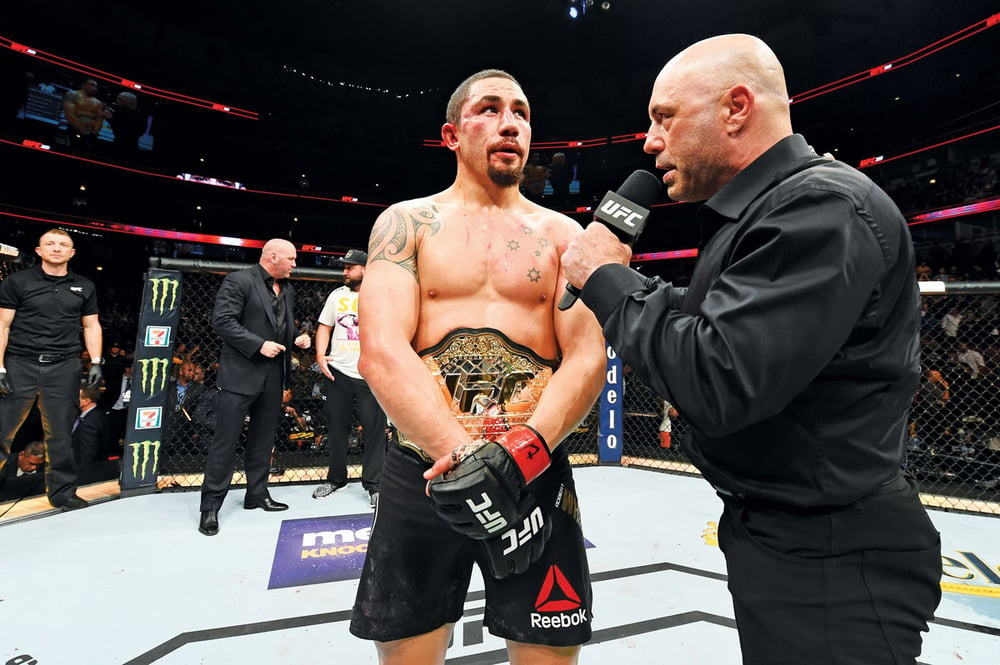
UNEXPECTED LESSONS
Whittaker’s career has offered an incredible journey that’s created so much opportunity for growth and learning, but some lessons stand out more than others. When pressed about one lesson he’d like to give to the younger generation, he doesn’t hesitate.
“Something that you don't really understand when you're younger is that nothing is forever,” he explains. “So, the way you train isn't forever. The people you're training with aren't forever. The coaches you have aren't forever. Everything has its ebb and flow. Things change, and you need to be open to those changes so that you don't fall apart. When you're younger, you just think that this is what I do. This is how I fight. These are the guys I train with. These are my coaches. And then someone won't want to fight anymore. And you'll be like, well, where am I going to get the partners from? Or then you'll have children, and then you can't do what you were doing anymore. You can't stay up all night. And then you'll have a wife. And then you'll have coaches you just don't get along with anymore. Like nothing is forever, so embrace the change and enjoy it.”
With this in mind, he offers insights into what legacy he hopes to create.
“I feel like I'm in the prime of my career to get that belt back,” he says. “That's what I want to do. That's where I want to finish my career. You know, with that belt wrapped around my waist. That's the dream. That's the goal. That's the objective right now. And then post-career? I just want to be a dad. I just want to be a stay-at-home dad. Preferably, you know, just retire, put my feet up, and, I don't know, kick the ball around with the kids. Is that what you do? I don't know, but I want to spend time with the kids.”
As he prepares for his next fight, we are reminded that the mark of a true champion is not just measured by victories but by the resilience and integrity they display in every aspect of life. Whether he’s navigating the pressures of the sport or spending quality time with his family, Whittaker continues to inspire us all. True champions like him fight as hard in life as they do in the arena.





